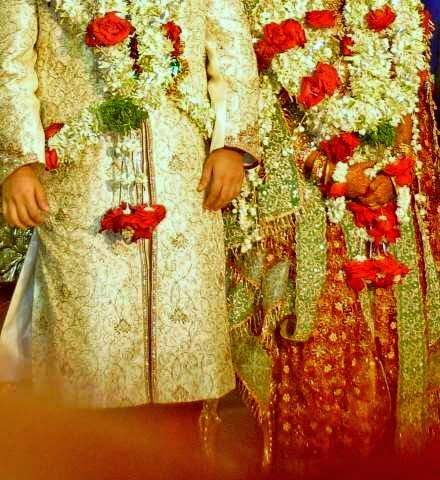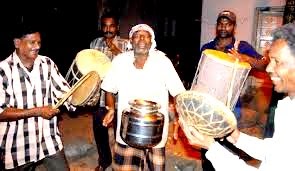Hyderabadi Weddings
Traditional
Muslim weddings are quite sober yet fun to be in. Hyderabadi weddings include
pure Hyderabadi stuff like the marfa band, the tradition of distributing dry
fruits immediately after Nikah. Then, there is the culture of using carts for
taking fruits, bride’s clothes in dishes. It’s completely unique in its own
way.
What
is the best aspect of a Hyderabadi shaadi? For me, it is the Nawabi style
that people act with. From groom’s parents to bride’s parents, every
individual does everything in style. From clothes to food, everything is done
in relaxed and calm fashion.
That’s
how people have always been. It is known as the city of Nawabs and the Nawabi
culture still has a deep impact on the people of Hyderabad. The wedding
preparations are done till the time groom and bride leaves for the wedding
function hall. That’s how Nawabs have always been.
Apart
from that, if you look at the Hyderabadi groom wear especially the sherwani
designs and the Indian bridal wear tradition, you would realize how strong
influence the Nizams and other Nawabs have on its people. Even the Indian
turban that’s popularly used in the marriages represents the Nawabi
tradition.
This
unique appearance of men and women is delight for the eyes. For fashion
lovers and those who love historic traditions, a true Hyderabadi shaadi is
the event to be in. It is great and you would have a great time being at it.
There
Nawabi style of doing things at the wedding are known throughout the world
and most people who’ve seen it simply love it.
|
Engagement
Engagement is a ceremony where the groom and bride exchange
rings. This ceremony signifies that the couple and their families are now
bond in a new relationship and this is the first step in their newly formed
relationship.
|
Pawmis ka rasam takes place in the period between engagement
ceremony and nikah. In this rasam the groom’s family comes to the bride’s
house and take measurements for her wedding clothes, sandals and bangles. It
is a small ceremony which is attended by the close family members only.
|
Manja
Manja day is special for the bridal family, where every member of
the bride and groom wear yellow clothes. Manja usually last from 1 to 6 days
depending on guests coming each day before the marriage giving her their
blessings and wishes by applying turmeric paste on her, as it’s good for the
bride in whitening her skin and giving glow and a fresh look before her marriage.
Manja is also done for the groom but it’s usually a quiet and short affair
unlike the bride.
|
Sanchk
Sanchk as in mehndi it’s a day right before marriage everyone
wears henna on their hands and legs and the bride apply henna on her hands
and legs, husband name written by
henna on the bride’s hand . Everyone wears green and as well the bride and
the grooms family brings the all gifts and things which are bought for the
bride which she will be wearing on her wedding day and valima. The groom’s family
comes to the bride’s house with relatives and adorns her with all the gold
jewelry, wedding and reception clothes, besides other dresses and accessories
they got for her. In short, they make her “the bride”.
|
In Mehndi rasam, the bride’s family goes to the groom’s house
with all the gifts for the groom. There takes place a small ritual where one
of the younger sisters of the bride applies mehndi/henna to the groom’s
finger and holds it tight without letting him go until the groom agrees to
pay the amount she is asking for. It’s a fun filled ritual where everyone of
the guests enjoy watching the ceremony where the groom and his sister-in-law
keep negotiating on the amount, and the groom trying to pull his finger off,
etc. Finally, when they agree upon an amount mutually, the sisters-in-law receive
the money from the groom and let him go. This is followed by dinner or snacks
and everyone proceeds to their homes respectively.
|
|
Jahez could include anything that the bride’s family is willing
to give to their daughter in her marriage. It could include the bed set,
furniture, electronics, clothes, jewelry, accessories etc. Some people even
gift their daughter’s property or car or anything they wish for. Though it is
not a compulsion, some families demand certain things from the bride’s family
as part of jahez. Jahez in other words is dowry and it is now an illegal act
unless the families mutually agreed upon.
|
Nikah is the main day when the actual wedding takes place in
presence of Qazi. The bride wears red The groom and the bride sign few papers
separately in presence of some witnesses and Qazi, followed by a short prayer
to give blessings for the wellness of the newly wedded couple. Nikah is then
followed by dinner. After the dinner the groom comes from the mens’ section
to the bride or women section and they are made to sit together on the stage.
One of the eldest members of the family comes and makes the couple wear
garlands and gifts them.
|
|
To highlight the wedding day, the families call the Marfa band
and dance to the tunes of the band members. Mostly the men dance and everyone
enjoys watching them. This is usually done to mark the happiness of the newly
wedded couple.
|
After all the ceremonies have taken place it’s time for the bride
and her family to bid farewell to each other. Since the bride is leaving her
own family to be taken to her husband and new family, she becomes nervous and
sad besides the happiness of being married. It’s the most difficult part of
the wedding both for the bride and her parents as they now need to say bye to
each other. The bride cries exchanging hugs with her parents before being
taken away to her new house, the groom and the bride car is decorated by
followers. She is welcomed by her new family and they make her feel at home
by making the couple play some simple and fun filled games. Their room and
the bed should be decorated by fresh natural roses and flowers
|
|
Valima or reception party is the party hosted by the groom’s
family post the wedding. It could be held the very next day of the wedding or
in another couple of days. All of the relatives of the bride’s family are
invited for the ceremony. There is no specific ritual or rasam that takes
place this day but it’s just a dinner party.
|
Jumagi
The word Jumagi comes from the word “Juma” or Friday as the party
is hosted on Fridays after the wedding. It depends on the families on how
many weeks they want to host a party for the newly married couple. Only a few
close relatives are invited for the ceremony and the couple receives gifts
from their near and dear ones.
Done by: Rasha Humaid Notice: You can contact me on this email address : Rasha-humaid@live.com |
Hyderabadi weddings
Saturday, 14 June 2014
Subscribe to:
Comments (Atom)




















